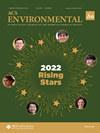Responding Together to Global Challenges
IF 6.7
Q1 ENGINEERING, ENVIRONMENTAL
引用次数: 0
Abstract
T shepherd sustainable systems through times of global development and change, the environmental research community has long drawn on an interdisciplinary skill set. This includes environmental chemistry, biology, physics, materials science, and the engineering pursuits required to translate those advances in fundamental knowledge to tangible benefit for society. This past week, the biannual meeting of the Association of Environmental Engineering and Science Professors (AEESP) convened in Boston, MA, USA under the theme “Responding Together to Global Challenges.” Of particular focus at the meeting was the evolving role of environmental engineers and scientists in the context of climate change. The traditional contributions of the field have been central to the growth of civilizations, ecosystem services, and striving for ecological preservation, but are now called upon to meet the accelerating demands of a climate changed world. These include prediction of novel patterns of precipitation and drought, better and bespoke agricultural practices, water, sanitation, and hygiene (WASH), as well as decarbonization technologies, geochemical impact assessment, climate justice, and sustainable resources and energy. Innovative thinkers from a spectrum of environmental professions and adjacent implementers (e.g., philanthropists, financers, policymakers, utility and infrastructure experts) are needed to support the grand goal of our collective work: protecting human and ecological health while promoting sustainable systems. Indeed, adapting to and mitigating the impacts of climate change are often articulated as the technological and policy challenge of our time. The readership and authors in the ACS Environmental Au community are empowered with the skills required to provide solutions to these challenges, and this new issue contains a collection of four Articles and a Review illustrating key progress in this pursuit.共同应对全球挑战
本文章由计算机程序翻译,如有差异,请以英文原文为准。
求助全文
约1分钟内获得全文
求助全文
来源期刊

ACS Environmental Au
环境科学-
CiteScore
7.10
自引率
0.00%
发文量
0
期刊介绍:
ACS Environmental Au is an open access journal which publishes experimental research and theoretical results in all aspects of environmental science and technology both pure and applied. Short letters comprehensive articles reviews and perspectives are welcome in the following areas:Alternative EnergyAnthropogenic Impacts on Atmosphere Soil or WaterBiogeochemical CyclingBiomass or Wastes as ResourcesContaminants in Aquatic and Terrestrial EnvironmentsEnvironmental Data ScienceEcotoxicology and Public HealthEnergy and ClimateEnvironmental Modeling Processes and Measurement Methods and TechnologiesEnvironmental Nanotechnology and BiotechnologyGreen ChemistryGreen Manufacturing and EngineeringRisk assessment Regulatory Frameworks and Life-Cycle AssessmentsTreatment and Resource Recovery and Waste Management
 求助内容:
求助内容: 应助结果提醒方式:
应助结果提醒方式:


